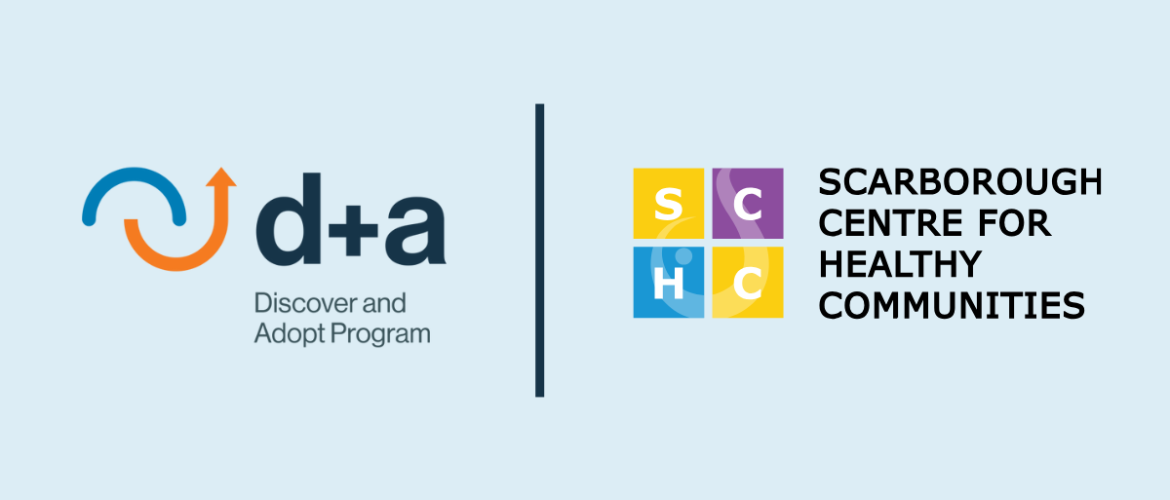Many promising innovations have the potential to transform care delivery, but organizations often struggle to identify and implement the most relevant solutions to meet their specific needs and address their challenges. The Centre for Aging + Brain Health Innovation launched its Discover + Adopt (D+A) program in 2023 to support healthcare organizations in adopting innovation to address critical pain points they experience.
Scarborough Centre for Healthy Communities (SCHC) took part in the program’s second cohort, looking for an innovation that would improve staff capacity to communicate effectively with clients experiencing cognitive decline and/or differing communication abilities.
Through CABHI’s D+A program, SCHC was matched with Kaleidoscope XR for Caregiver VR – a platform that enables live role-playing simulations between trainer and trainee acting as either caregiver or resident in front of a virtual classroom of students.
Caregiver VR proved to be a useful innovation for the SCHC team, meeting the initial project scope of improving staff capacity for effective communication. As Callum Tyrrell, VP of System Integration, Innovation and Engagement at SCHC, explained, “The experience with the solution was a success and the vendor was supportive and available.”
Through using Caregiver VR, SCHC noted improved client access to care and support, improved client experience, improved confidence in care, improved cost-effectiveness of the healthcare system, improved cost-utility of the healthcare system, and ultimately, improved quality of life.
“In addition to these outcomes, through our work on this project, we gained valuable insights into capturing qualitative data on staff monitoring behavioural changes over time. This journey led us to develop our own app for real-time data capture, feeding into a robust qualitative database,” explained Callum. “Building on this foundation, we are now developing a machine learning algorithm to analyze the data and provide predictive analytics, enabling staff to proactively intervene. This work will extend beyond dementia care, offering broader applications for influencing health-seeking behaviours.”
In addition to meeting its initial needs, upon further use of the Caregiver VR platform, SCHC realized the added value the platform could bring to other areas within the organization. SCHC has plans to use the platform to improve communications with clients in both its Adult Day Centre and Acquired Brain Injury programs, as well as supporting its continuing Diversity, Equity, Inclusion, and Belonging (DEIB) efforts.
SCHC is set to build upon Caregiver VR’s data analytics capacities to create predictive modelling, helping identify early intervention possibilities and leading to a reduction in adverse events and incidents in all its program areas.
“Essentially, in exploring the solution and monitoring the data, we unlocked doors to understand qualitative data that we could capture on staff monitoring behavioural change over time. As a part of that, it grew to the point where we created our own app to capture these qualitative measures in real-time, feeding into a qualitative mass database,” said Callum Tyrrell, VP of System Integration, Innovation and Engagement at SCHC. “We are now processing the development of an ML algorithm to sit on top of that database and spit out predictive analytics for how staff can intervene upstream, not limited to people with dementia but more broadly to influencing behavioural changes in health-seeking behaviours.”
The Caregiver VR space has huge potential for SCHC to not only train a broader array of partners through its community-based research and education centre in Scarborough, but also to support its DEIB efforts through phenotype and eye-tracking capabilities.
Thanks to CABHI’s D+A program, SCHC intends to procure the solution (and build upon it) to improve client communication experiences, reduce inequities for both providers and clients, and improve the communication and well-being of our communities through increased empathetic awareness in a safe, virtual space.
Do you think your healthcare organization could benefit from support with adopting innovation? Learn more about CABHI’s D+A program and how you can get involved: https://www.cabhi.com/discover-and-adopt-2/.


